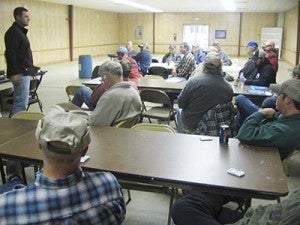Pesticide applicators earn recertification
Published 10:44 am Wednesday, December 11, 2013
COURTLAND—There’s more to applying pesticides on field or garden crops than just reading product labels. Handling potentially dangerous chemicals – in any form – requires close study. Further, certification is required by law in order to ensure that the applicators do their job properly without endangering the lives of humans, animals and even the environment.

Southampton County extension agent Chris Drake, left, speaks to farmers needing to be recertified in pesticide application. Drake figures to recertify about 50 license holders from Tuesday and Thursday’s sessions. STEPHEN H. COWLES | TIDEWATER NEWS
But getting that documentation once is not enough, especially when new products come on the market, or there are changes to those already in use.
For that reason, recertification is periodically required, and Southampton County extension agent Chris Drake will conduct programs such as the one that took place Tuesday morning at the Fairgrounds; he’s got another set for Thursday evening at the same venue.
“Between the two sessions I expect to recertify about 50 license holders,” said Drake. “Some people will attend the annual peanut or cotton production meeting in February to obtain their credits.”
He added there’s no fee to the applicators for these training sessions.
Drake went on to say that both the county and Franklin have 169 certified private pesticide applicators, and they’re licensed through the Virginia Department of Agriculture and Consumer Services to use the chemicals on commercial properties, lawns as well as farms.
To re-certify, the applicators must attend approved training programs every two years, he said, and added, “They can accrue up to four years of credit, but these sessions provide two years of credit for the license holders.”
Issues reviewed are general safety, legal aspects, pest management and application technology, said Drake. The courses can last from a minimum of four hours and go on as long as eight, depending on what credit is needed.
Either extension agents such as himself or VDACS officials organize the programs in their respective districts, he said, “to provide essential recertification credits that the applicators must have to continue legally applying pesticides to their crops and property.”
Early in the day’s course, Sean Malone, an entomologist from the Tidewater Agricultural Research and Extension Center spoke about insects that can be destructive or even beneficial to crops. An example that Malone gave of the former is the kudzu bug from Asia, which is quite invasive, especially in most of Virginia. In contrast, red imported fire ants can be helpful in getting rid of other pests.
To reinforce what had been learned, Drake conducted a quiz bowl using Turning Point Technologies software and Response Ware clicker system. The participants see questions on a screen and answer by pressing the button corresponding to what they think are the correct answers. There was even a prize for getting the most correct answers, and W.T. Drake Jr. of Newsoms won $20; he scored 61 points and his accuracy was about 88 percent.





